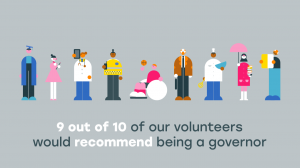
We know that school governors have a critical job. They set the strategic direction of schools, support and challenge the headteacher, and make sure public money is well spent. But historically, it’s been difficult for us to measure their impact, because it isn’t instant nor always visible.
Over the course of last year, we worked with Pro Bono Economics (PBE) to find out the impact we have on volunteers and schools – and what impact volunteers have on the schools they support.
Impact reports should tell the story of what an organisation does in a compelling way. They also need to provide actionable insight by illustrating what a charity is doing well and where it can improve. The report PBE produced isn’t staying on the website as a download to read occasionally – it’s become something we as a charity live and breathe. It’s given us the ability to do things differently, showing where we need to focus our energy to continue making the biggest positive impact. It’s also enabled us to create an animation that brings the findings to life.
We’re building the findings into who we are and the way we talk about ourselves, using what we’ve learnt to shape our plans for the next year. Knowing that 9 out of 10 of our volunteers would recommend being a governor to a friend, for example, puts us in a strong position to start a Refer a Friend scheme. And we know that 85% of our governors are still in post, which for the 67% of schools that find recruiting governors difficult, is a massive benefit. It’s getting these messages out that will help us achieve our goals of finding more people to volunteer in the role and encouraging more schools to register their vacancies with us, and ultimately enabling schools to deliver excellent education.
Working with PBE has been hugely beneficial for three main reasons:
- We’re experts in school governance, but we’re not economists. So having PBE on board to validate our assumptions was vital and the team have been key to our success this last year. We needed to be certain that what we’re saying is right, and not give ourselves undue credit.
- Small charities don’t have huge resources and we’re no exception. PBE provided their services for free – and having access to professional economists wouldn’t have otherwise been possible. We invested our time, and in return, the team of experts helped us develop and refine our approach, giving us more robust insight into the people and schools we work with.
- PBE’s expert economists enabled us to make the most of the project. Our project lead was new to Governors for Schools, the third sector as a whole, and also to research. As is the case for many charities, we don’t have someone responsible for measuring impact as their only role. Instead, it’s part of a role with many other plates spinning alongside. PBE enabled us to make measuring our impact a focus, which in return has provided us with invaluable insight.
Now we know more about the impact we have, what’s next?
The impact report has shown us what we’re doing well and identified areas we could improve. One of these key areas is around professional development – and the role board experience plays in career advancement.
Over a quarter of governors who responded to the survey said that their career has benefitted from being a governor. This is a valuable finding that we’re diving further into. We’re conducting more research with this pool of people to ask about the skills they’ve learnt as a governor which have helped them in the work place. The project will provide evidence for talent development that will give HR Learning & Development teams the tools to promote school governance as a tool for development, not only CSR.
We now know for certain that the role benefits the individual (86% of volunteers love or enjoy their role), the employer (over a quarter of volunteers have seen a direct career benefit), and the community (our volunteers bring £9.9m worth of value to schools every year, a tenfold return on investment in Governors for Schools). Working with PBE to understand our impact has given us the evidence we needed demonstrate the value of Governors for Schools, and will inform many of our big decisions going forwards.